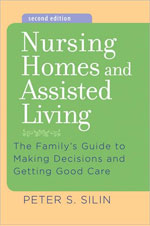Caring for Caregivers
Peter Silin, Special to the Vancouver Sun
Published: Tuesday, March 21, 2006
Sometimes tragedy is the impetus to review and remake a system. With commitment, we can take what we learn and make things better. Perhaps the legacy of the deaths of Frances and Alfred Albo a few weeks ago will lead British Columbia's health authorities to do just that in our system of eldercare.
Over the past few years, significant changes in resources for and policies concerning our older citizens have taken place. They include decreasing the amount and type of home support available to people living at home, increasing the frailty level required before someone is eligible for complex nursing home care, reducing rehabilitation opportunities and a focus on reducing hospital bed occupancy days.
Care and planning policy for seniors focuses on the individual, not on the couple or family.
The result of these policies and changes is myriad. The most subtle one is that it increases the burden on caregivers to fill the gap left in services. The lectures on eldercare I give to businesses and employee groups are filled with stressed and depressed caregivers who are pulled between work responsibilities and aging parents or spouses.
These problems have been exacerbated by the closure of hospital and care facility beds before others were ready to take their place. Hundreds of beds have been closed; especially in rural areas, which means no facilities in communities that once had them. The remaining ones are strained because of higher demand.
There are several solutions to the problems we are encountering.
First, discharge planning and placement policies need refocusing to "target" the couple or the family. Such policies would automatically keep couples together, and would take into account natural support and emotional networks. This shift from planning for the individual to planning for a family unit is a fundamental shift. We also need to commit to adequate planning for discharge, and discharge only to the appropriate space.
Discharge planning needs to provide education and support to families through the crisis that results from becoming caregivers. Family members who understand the process and have a sense of confidence are better caregivers than ones who feel they are lost.
Second, we need to look at different housing models, especially in rural areas. In B.C., we already have Folkstone Family Homes. Folkstone is a non-profit agency that seeks out families who wish to care for someone in their own homes. They train and support them to do so. This is a cost-effective model of providing services over a wide area, without capital building costs. Following and expanding the Folkstone model, we should be developing small group homes for two or three people. These are community -based, non-profit models that are replicable anywhere.
Third, we need to reinstate some of the home support services that were demolished, a decision that was most likely "penny-wise and pound foolish."
Fourth, we need to look at utilizing other resources in more creative ways. Nursing home rooms could be used half a week by one resident, half by another. Co-op programs run by churches or families and supported by the province can develop adult day centres or small socialization programs, home meal programs, or recreational opportunities. With adequate provisions for privacy, people might be monitored by computer or camcorders in their homes.
Fifth, we need to look beyond the care system. We need to encourage businesses to support their staff. Can new developments receive added density if they put in services for seniors, or a floor of housing? Can we stimulate neighbourhoods to provide for their elderly, similar to Neighbourhood Watch or Block Parents programs? Networks can be developed along the lines of those advocated by the Planned Lifetime Advocacy Network (PLAN). When the False Creek lands are developed, can we combine the day care for children with daily programs for adults?
Oh, and let's also get those additional 5,000 beds (the ones the Liberals promised several years ago) up and running soon.
Peter Silin is principal of Diamond Geriatrics, an eldercare consulting and geriatric care management company in Vancouver and the author of Nursing Homes: The Family's Journey.
www.diamondgeriatrics.com© The Vancouver Sun 2006



